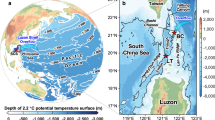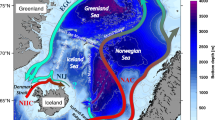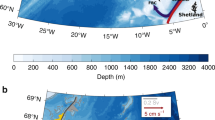Abstract
The overflow of cold, dense water from the Nordic seas, across the Greenland–Scotland ridge1 and into the Atlantic Ocean is the main source for the deep water of the North Atlantic Ocean2. This flow also helps drive the inflow of warm, saline surface water into the Nordic seas1. The Faroe Bank channel is the deepest path across the ridge, and the deep flow through this channel accounts for about one-third of the total overflow1,2. Previous work has demonstrated that the overflow has become warmer and less saline3,4 over time. Here we show, using direct measurements and historical hydrographic data, that the volume flux of the Faroe Bank channel overflow has also decreased. Estimating the volume flux conservatively, we find a decrease by at least 20 per cent relative to 1950. If this reduction in deep flow from the Nordic seas is not compensated by increased flow from other sources, it implies a weakened global thermohaline circulation and reduced inflow of Atlantic water to the Nordic seas.
This is a preview of subscription content, access via your institution
Access options
Subscribe to this journal
Receive 51 print issues and online access
$199.00 per year
only $3.90 per issue
Buy this article
- Purchase on Springer Link
- Instant access to full article PDF
Prices may be subject to local taxes which are calculated during checkout




Similar content being viewed by others
References
Hansen, B. & Østerhus, S. North Atlantic - Nordic Seas exchanges. Prog. Oceanogr. 45, 109–208 (2000).
Dickson, R. R. & Brown, J. The production of North Atlantic Deep Water: Sources, rates and pathways. J. Geophys. Res. 99, 12319–12341 (1994).
Turrell, W. R., Slesser, G., Adams, R. D., Payne, R. & Gillibrand, P. A. Decadal variability in the composition of Faroe Shetland Channel Bottom Water. Deep-Sea Res. 46, 1–25 (1999).
Hansen, B. & Kristiansen, R. Variations of the Faroe Bank Channel overflow. Rit Fiskid. 16, 13–21 (1999).
Østerhus, S., Hansen, B., Kristiansen, R. & Lundberg, P. The Overflow through the Faroe Bank Channel. Int. WOCE Newsl. 35, 35–37 (1999).
Borenäs, K. M. & Lundberg, P. A. On the deep-water flow through the Faroe Bank Channel. J. Geophys. Res. 93, 1281–1292 (1988).
Saunders, P. M. Cold outflow from the Faroe Bank Channel. J. Phys. Oceanogr. 20, 29–43 (1990).
Whitehead, J. A. Topographic control of oceanic flows in deep passages and straits. Rev. Geophys. 36, 423–440 (1998).
Crease, J. The flow of Norwegian Sea Water through the Faroe Bank Channel. Deep-Sea Res. 12, 143–150 (1965).
Østerhus, S. & Gammelsrød, T. The abyss of the Nordic Seas is warming. J. Clim. 12, 3297–3304 (1999).
Bacon, S. Decadal variability in the outflow from the Nordic Seas to the deep Atlantic Ocean. Nature 394, 871–874 (1998).
Dickson, R. R., Meincke, J., Vassie, I., Jungclaus, J. & Østerhus, S. Possible predictability in overflow from the Denmark Strait. Nature 397, 243–246 (1999).
Clarke, R. A., Swift, J. H., Reid, J. L. & Koltermann, K. P. The formation of Greenland Sea deep water: Double diffusion or deep convection? Deep-Sea Res. 37, 1385–1424 (1990).
Rahmstorf, S. Shifting seas in the greenhouse? Nature 399, 523–524 (1999).
Rahmstorf, S. & Ganopolski, A. Long-term global warming scenarios computed with an efficient coupled climate model. Clim. Change 43, 353–367 (1999).
Blindheim, J. et al. Upper layer cooling and freshening in the Norwegian Sea in relation to atmospheric forcing. Deep-Sea Res. 47, 655–680 (2000).
Cappelen, J. & Laursen, E. V. The Climate of the Faroe Islands (Danish Meteorological Institute Technical Report 98-14, Copenhagen, 1998).
Hurrell, J. W. Decadal trends in the North Atlantic Oscillation: Regional temperatures and precipitation. Science 269, 676–679 (1995).
Acknowledgements
The ‘Nordic WOCE’ project was funded by the Nordic Environmental Research Programme for 1993–97, and by Nordic national research councils. The ‘VEINS’ project was supported by the MAST IV Programme of the European Community.
Author information
Authors and Affiliations
Corresponding author
Rights and permissions
About this article
Cite this article
Hansen, B., Turrell, W. & Østerhus, S. Decreasing overflow from the Nordic seas into the Atlantic Ocean through the Faroe Bank channel since 1950. Nature 411, 927–930 (2001). https://doi.org/10.1038/35082034
Received:
Accepted:
Issue Date:
DOI: https://doi.org/10.1038/35082034
This article is cited by
-
Sea level anomalies affect the ocean circulation at abyssal depths
Scientific Reports (2023)
-
Increasing deep-water overflow from the Pacific into the South China Sea revealed by mooring observations
Nature Communications (2023)
-
Enhancement of the southward return flow of the Atlantic Meridional Overturning Circulation by data assimilation and its influence in an assimilative ocean simulation forced by CORE-II atmospheric forcing
Climate Dynamics (2017)
-
North Atlantic warming during Dansgaard-Oeschger events synchronous with Antarctic warming and out-of-phase with Greenland climate
Scientific Reports (2016)
-
Distribution of nine cold-water coral species (Scleractinia and Gorgonacea) in the cold temperate North Atlantic: effects of bathymetry and hydrography
Hydrobiologia (2015)
Comments
By submitting a comment you agree to abide by our Terms and Community Guidelines. If you find something abusive or that does not comply with our terms or guidelines please flag it as inappropriate.



